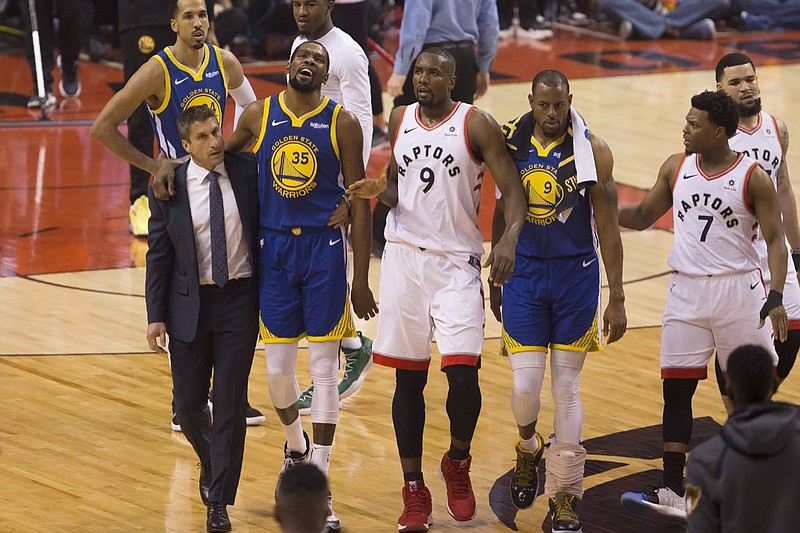According to the Western Interstate Commission for Higher Education, approximately 1.53 million males graduated from American public high schools this spring.
When one considers that only 12 young men from the 2018 high school graduation ranks were selected in the NBA draft a little less than two weeks ago, pro basketball is probably not in most of those 1.53 million guys' futures.
Yet to read that over $3 billion in contracts were offered to NBA free agents over the past weekend - contracts that can't be signed until July 8 - is to begin to understand why far too many young men in this country focus on sports as a profession.
Heck, the Brooklyn Nets apparently will sign injured superstar Kevin Durant to a four-year contract reportedly worth $161 million, and Durant isn't even expected to play next season after rupturing an Achilles' tendon while playing for the Golden State Warriors in Game 5 of this year's NBA Finals against eventual champion Toronto.
How stunning that amount of money, which was agreed to in a little over six hours between 6 p.m. Sunday and 12:38 Monday morning, when news arrived that Denver and veteran guard Jamal Murray were agreeing to a five-year, $170 million deal? The gross national product of Liberia is a shade over $3 billion a year.
It's all crazy, and reasonable men and women are certainly free to argue about the message it sends to those 1.53 million young men with 2019 high school diplomas who probably would be far better served learning how to be an accountant, carpenter, electrician, engineer, plumber or teacher.
But as we also are now less than 48 hours away from celebrating our 243rd Independence Day, the freedom to dream about becoming a multimillionaire by shooting a basketball is also what makes us the greatest nation on earth.
Or as Lloyd Christmas famously blurted out in "Dumb and Dumber" when told his chance of landing the girl of his dreams was one in a million, "So you're telling me there's a chance."
It's a darkly funny moment on the silver screen. When it comes true in real life, there are always a lot of "I told you sos" and "don't let anyone steal your dreams" speeches.
And there is always a grain of truth in that. Including those receiving 10-day and two-way contracts - contracts that float a player between an NBA team and its G league affiliate - perhaps as many as 750 athletically gifted men each year play professional basketball in the United States. Toss in those with respectable contracts in Europe and Asia and that number could swell to as many as 3,000.
But there's also a mountain of evidence that becoming a professional athlete or entertainer of any kind won't happen. Instead, all those who put all their hopes and dreams in that single hoops basket - a basket with a hole in the bottom of it, by the way - are ignoring both the odds and common sense, and often to their great detriment somewhere later in time.
Don't misunderstand me. While I'll forever argue that no one is worth the money today's modern pro athletes earn when we pay our teachers and police officers and firefighters and most of all, worst of all, our servicemen and women what we do - in 2018, a private first class (an E3 designation) earned roughly $37,000 a year to help defend our country - it is a free market economy.
If some multibillionaire owner is willing to pay you $40 million a year to play a game, it's probably because he believes his team has enough fans out there to deliver a smart return on his investment.
Yet as national political debates begin in advance of the 2020 presidential election, and public high school education studies continue to paint a picture of a United States struggling more and more to keep pace with the world's best and brightest, is it not right to at least consider that we've got all of this all wrong, both in theory and practice?
It is anyone's right to focus our young people on the distant dream of being paid $161 million over four years to play basketball. But would not a greater good be served by focusing our nation's youth on realistic goals - some of them centering on careers in law enforcement, the military or teaching - by improving those professions' salaries?
We might even try celebrating all those other working-class heroes who rise each day to earn a middle-class wage because they're determined to put a roof that doesn't leak over the heads of their loved ones, healthy food in their bellies and clean clothes on their backs, as well as to have the security of knowing those dependents won't have to worry about losing those basic amenities until it's their turn to provide for their loved ones years somewhere in the future.
Again, there's nothing wrong with dreaming big. But as this loony largesse that NBA owners all seem to be reaping these days trickles down to a few fortunate souls, wouldn't it be nice if more of our youth embraced the reality that they're far more likely to wind up selling basketballs at a sporting goods store than being paid to shoot them for an NBA franchise?
Because even graduates of the U.S public education system - which recently was ranked 38th out of 71 countries in math proficiency by the Programme for International Student Assessment - should be able to understand that 12 out of 1.53 million males being drafted into the NBA is an overwhelming reason to chase a more reasonable dream than becoming the next Kevin Durant.
Contact Mark Wiedmer at mwiedmer@timesfreepress.com.

